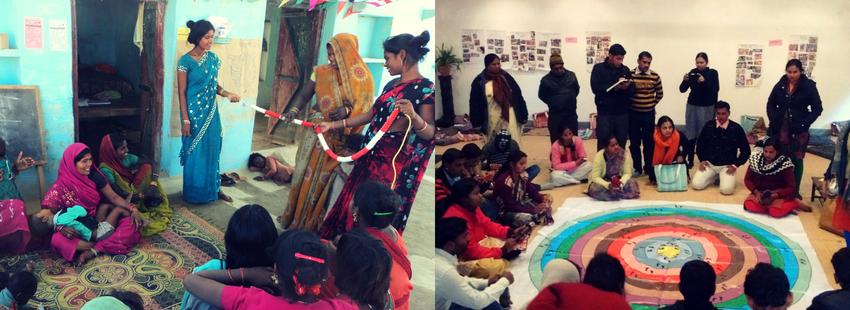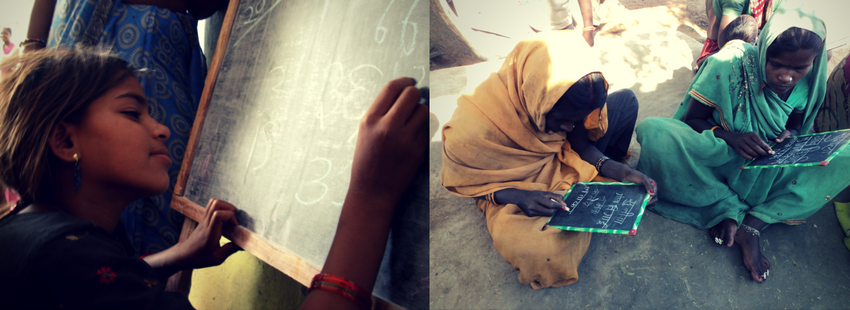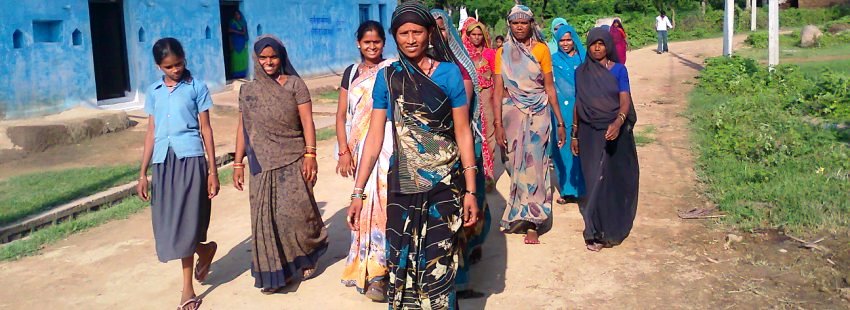Women's Education and Empowerment
Introduction
Our work, aimed at women from marginalised communities, involves literacy as well as education—defined more broadly as structured learning that empowers the learners. We engage with literacy in a way that has women at its centre, and also their rights, needs, and interests, including the pleasure of reading and engaging with a world beyond their own.
Nirantar’s journey of working on adult literacy and education began in a context wherein even though overall literacy rates were soaring as compared to previous standards, adult women’s literacy and education standards remained stagnant and abysmal. Mainstream adult literacy and education programmes often sought to project women as better mothers and responsible citizens.
In 1986, women’s education was addressed as part of the larger national education strategy and in accordance, the Mahila Samakhya (MS) programme was established. Nirantar collaborated with MS in Uttar Pradesh to develop a residential education programme for rural women and in conducting residential courses. Gradually, programmes working on women’s livelihoods, SHGs and leadership through panchayats and federations started to realise the indispensability of adult literacy and education in creating women’s leadership and empowerment. However, in an environment that lacks capacity-building training and literacy and educational material from a rights-based and empowerment perspective, Nirantar offered and still works towards filling this gap.
To actualise its own vision for women's literacy and education, in the year 2002-03, Nirantar spearheaded a community-based programme called the Sahjani Shiksha Kendra (SSK) in Lalitpur district of Uttar Pradesh, for women and adolescent girls belonging to the most marginalised communities of the region, including Dalits and Adivasis. The programme aimed at empowering these women and girls by linking their lived realities to its educational initiatives and bringing them into various leadership roles. SSK now operates as an independent organisation. Click here to contact Sahjani Shiksha Kendra
From 2009–2018, we worked on a 3-year model of the women’s literacy programme, where we offered structured and intensive inputs with regards to planning, training, monitoring and evaluation over a period of 3 years to partner organisations that aim to start literacy programmes.
In 2018, an integrated digital literacy programme called Applied Digital Literacy (AppDiL) was conceived by Nirantar in response to the changing context where technology and digital invaded the lives of common people. This further impacted educational needs of women in context of their livelihoods and new forms of knowledge essential for women’s empowerment. The 18-months AppDiL programme was piloted from 2018 to 2020.
Till date, Nirantar has done capacity building work with 30 organisations and 800 teachers who have, in turn, worked with over 45,000 women learners.
Interventions
Nirantar believes that literacy is critical for autonomy, self-expression, accessing entitlements and challenging exploitation. We intensively build capacities, assist in planning, training, monitoring, and evaluation, and develop materials for organisations that want to provide empowering literacy opportunities for women.
Building Capacities of Organisations: Nirantar responds to the needs of the agenda of adult women’s literacy and education, by entering into intensive partnerships with NGOs. Our capacity building enables organisations to run literacy programmes by addressing the entire range of issues involved in designing such a programme, including the approach, operational strategies, capacity building, monitoring and evaluation, curriculum and material creation.
The team at Nirantar offers inputs to each of our literacy partner organisations—initial orientation, capacity building of the staff members involved in the programme, content creation, a refresher training for teachers and educators, perspective building on gender and technology and planning strategies of the programme. Monitoring and evaluation is another crucial part of our programme structure, where the strategies, implementation, and outcomes are assessed both quantitatively and qualitatively. In addition, we facilitate mid-term ‘review and reflection’ meetings and field visits with our partner organisation to evaluate the planning, follow ups, and feedback process. We work with the belief that teachers are the backbone of any literacy intervention.
Nirantar conducts an ‘Annual Literacy and Empowerment Training’, a seven-day residential training that enables potential partner organisations to design, implement and monitor literacy programmes.
Knowledge Creation and Educational Material: Over the years, we have developed well-known and widely used resources such as curricula, primers, manuals on the themes of SHGs, gender and health, panchayats, digital skills, and numeracy. The resources also reflect the larger idea of adult literacy and education going beyond acquiring skills of reading and writing to build critical thinking. We aim at building the linkages between gender and education in women’s lives, and also for the joy of reading through our material. Field interactions are a crucial part of developing the material, so that their efficacy is tested in the very process of creation. Helping grassroot organisations create resource material in Hindi and other regional languages for and by newly-literate women is essential to our work as well.
Promoting Adult Women’s Literacy and Education: Nirantar’s work highlights the significance of literacy in the lives of adult women from marginalised groups. We have discussed the issue of adult literacy with the state through policy formulations and by being part of drafting Sakshar Bharat. Along with this, we constantly engage with civil societies and partner organisations, and national-international platforms to talk about issues and field realities of literacy for adult women.
We have provided a thorough analysis of the state of education in the country from the pre-primary level onwards till adult education. We were also involved in writing the chapters on Education for the parallel reports prepared by civil society organisations for the UN CEDAW and ESCR committees and in taking forward the concluding observations of CEDAW and CESCR. Additionally, we have engaged with the process of the Universal Periodic Review III at the national-level to comment on and provide recommendations with regards to education within the country.
Supporting Women’s Collectives and Building Strategic Alliances in Bihar: Much of Nirantar’s work on feminist leadership and institutional strengthening, particularly in Bihar, has been with the Mahila Samakhya federations which came up between 2004–2009. Nirantar has contributed significantly in building a feminist leadership in the federations, working closely to conceptualise and replicate the Mahila Shikshan Kendra-s (MSK), the residential learning centres for out-of-school girls.
However, the withdrawal of the central government’s support to CBOs and federations stalled the institutional building and strengthening processes, leaving many of these federations without support. In order to sustain these women’s collectives, Nirantar decided to intervene and help build strategic alliances with different stakeholders. The regular interactions and deliberations at various levels (Sangha, Nari Adalats and Federations) have in fact shaped Nirantar’s action agenda in Bihar.
Starting with 3 federations from Gaya, Muzaffarpur and Rohtas in 2017, Nirantar currently works with 7 federations from as many districts to amplify voices of rural women and support them in acting against gender-based violence and discrimination. The federations reach out to over 24,000 women mobilised into 1,350 village-level collectives called Sanghas. The seven district federations are also members of the Alliance of Feminist Collectives. The focus of Nirantar’s support to federations is as follows:
- Institutional Strengthening: Training and hand-holding of federations and Nari Adalats for organisational governance and management is one of the key focus areas of Nirantar. We also aim to put in place systems and processes for statutory compliances, maintaining transparency in decision making and resource allocations.
- Community Resistance to Violence Against Women and Girls: Nirantar plays a critical role in helping federations re-imagine the role of Nari Adalats with a more gender inclusive and feminist lens, so as to ensure that the Adalats act against violence on all people including those with diverse sexual and social identities. Nirantar supports 21 Nari Adalats with 252 federation leaders actively working as Nari Adalat members.
- Reinforcing Feminist Consciousness: All activities and case work by federations and Nari Adalats are assessed and probed from a gender lens. We engage with the leaders of the federations to reinforce a feminist consciousness.
- Rights and entitlements: Nirantar plays the role of an educator and facilitator wherein federations are provided with information and knowledge about rights and services that poor households are entitled to. Training a pool of women leaders to actively monitor services and entitlements at the village level is the key intervention by Nirantar in order to ensure benefits of government programmes to federation membership. A total of 120 women with access to smartphones will act as Haq and Adhikar Sakhis across 21 blocks and 900 villages in which partner federations have their presence.
- Facilitating Livelihoods Promotion and Income Generation: Nirantar supports partner federations in their quest to explore sustainable institutional models of livelihoods promotion, and build linkages and partnerships with livelihoods promoting agencies and programmes. With active facilitation from Nirantar, the Jyoti Mahila Samakhya federation in Muzaffarpur has mobilised 300 farmer women for forming an all-women farmer producer organisation. Similarly, 3 district federations have been supported in starting mushroom cultivation with 150 Sangha members.
- Feminist Solidarity and Alliances: Nirantar believes that the realities of rural poor women need to be brought into the mainstream discourses around VAWG. It is important, therefore, that rural women be supported to mobilise themselves in larger associations for amplifying their voices at the national level. To this end, Nirantar is actively supporting the federations to build a state level alliance, and also play an active role in the already initiated Alliance of Feminist Collectives.



